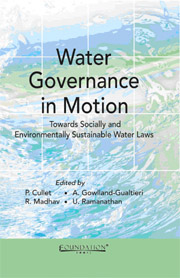Book contents
Introduction
Published online by Cambridge University Press: 26 October 2011
Summary
Water law in India has experienced significant changes over the past few years and is still evolving. These changes have an internal and an external dimension. On the one hand, water law grew over time into a relatively amorphous set of laws, principles, rules and judicial decisions. The lack of clear direction given, for instance, by an overall water legislation, setting principles governing all water in all its uses, explains in part the relative lack of clarity that water law exhibited. The need to give more clarity to this regulatory framework together with the changing situation in the water sector in general called for reforms. On the other hand, there has been a growing push among international institutions over the past two decades for water sector reforms and water law reforms in many countries. International water policy making has been very influential and a great number of developing countries have adopted reforms that closely follow the model proposed at the international level. The level of compliance with the set of principles propounded by international agencies can be partly ascribed to the fact that lending institutions, such as the World Bank, have strongly endorsed these principles and included them as part of their lending instruments. Since lending institutions such as the World Bank and the Asian Development Bank have been quite active in India and have included a number of law reform conditionality in their loans, a number of ongoing reforms in India are directly linked to international principles.
- Type
- Chapter
- Information
- Water Governance in MotionTowards Socially and Environmentally Sustainable Water Laws, pp. 1 - 8Publisher: Foundation BooksPrint publication year: 2010



